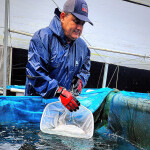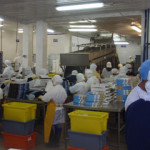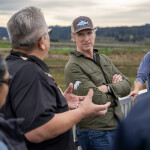For many years, Uruguay’s fishing sector was a small but productive part of the country’s economy, delivering consistent returns by focusing on the country’s abundant whitefish resources.
However, by the 2000s, Uruguay’s whitefish production was facing increased worldwide competition, according to Santiago Caro Ros, a communications and institutional relations specialist with DINARA-MGAP, a governmental body with oversight over fishing and agriculture.
“Too much competition from around the world – especially Alaskan pollock and Asian pangasius – reduced prices of Uruguayan products,” Caro Ros told SeafoodSource at Seafood Expo Global last month. “This forced many of our companies to close and we are still recovering from this regression in our market.”
In the 2000s, Uruguay received a second hit to its whitefish sector when a series of protectionist moves made by African countries hurt Uruguay’s exports there.
“It was a solid business, but these changes in policies hurt our exports again and caused another deterioration in the market,” Caro Ros said.
While Uruguay received a vote of confidence from fast-growing Canadian firm Cooke Aquaculture when it purchased Fripur, a Uruguayan seafood exporter, in December 2016, Caro Ros acknowledged the government believes the best path forward for the country’s seafood industry is diversification.
Caro Ros points to companies like San Gregorio de Polanco, a new caviar company farming sturgeon in the Rio Negro in the central part of the country, as holding the greatest promise for the future of Uruguay seafood.
“Before them and a few other companies started up in the last few years, aquaculture in Uruguay practically didn’t exist,” Caro Ros said. “Small but ambitious companies [like San Gregorio de Polanco] are starting up in Uruguay and have a bright future.”
Andrew Rynkowski, the production manager for Polanco Caviar, said the company currently has annual production capabilities of 10 tons of caviar and 700 tons of sturgeon meat. In an effort to attain a high quality for its products – and in part due to its isolation – the company has developed an entire breeding cycle on-site, where it raises sturgeon from spawning to slaughter, using its own proprietary feed. Rynkowski said executives from Polanco Caviar visited caviar production sites across Europe, including Russian, Poland, Germany, the Czech Republic and Italy, to learn as much as possible about the industry before starting up in 2010.
“The quality of our water is very high, and we’ve attained a good growth of the animals,” Rynkowski said. “We knew we could do well at the site we chose, but it took time because we needed to put in the work of learning from others who have more experience.”
Caro Ros said other fisheries-focused start-ups in Uruguay are working on development of less-utilized wild-caught fish, including merluza (hake) and corvina (drum).
“We are fortunate because we have no problems with our resources. We have good management and we haven’t faced shortages or the collapse of fisheries like in other countries,” Caro Ros said. “But it’s going to take work to recover from the setbacks we’ve had. The government is eager to continue to work with our national companies to reverse negative trends and recuperate our industry.”






